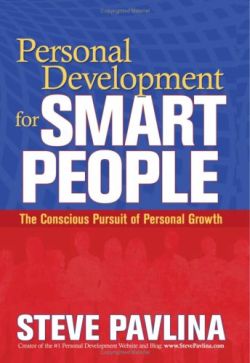Personal Development for Smart People

I enjoy reading personal development books. For instance, I’ve read “How to Win Friends and Influence People” 7 times. I love learning how to improve myself, but reading (or listening) to books doesn’t get me to act on that knowledge. In other words, I often don’t put into practice what I read.
There are a few notable exceptions, where books have motivated me enough to change my habits. David Allen’s Getting Things Done is one example. Steve Pavlina is another. His article on how to become an early riser persuaded me to wake up at 5am, a habit I maintained for 6 months. He also convinced me to try meditating, lucid dreaming and to analyze, explore and improve myself in various other ways. I’ve followed his blog from the early days when he was relatively unknown to the point where he’s now a well-known blogger and published author.
I was fortunate enough to receive an early review copy of his book, Personal Development for Smart People. I was supposed to have read it and submitted a review by now, but we had a new addition to the family a little earlier than we expected. Finishing and reviewing the book fell to the back burner as changing diapers and helping out around the house became the first priority. Now that things have settled down, I returned to reading the book and finished it last night.
One of the things I love about Steve’s writing is that he lays the facts down in a clear and straightforward manner. I find that refreshing. We think similarly, so it’s easy for me to relate to his analytical and logical thinking process. I understand where he’s coming from. And when he makes suggestions for experiments to try, they sound so easy to test them out, and I do. He invites you to make changes, however small, and to test them out for yourself. In the book, he lays down a framework that provides structure for the practical ideas in the second half of the book. These ideas interrelate and work together so well it’s as if they were a 500 piece jigsaw puzzle that he assembled.
Another thing I like about Steve’s writing and this is true with his blog as well as the book, is the way he forces you to think. He often presents unconventional ideas and challenges you to fit them into your current mode of thinking. They often don’t fit, but even when you don’t agree with his ideas, he gets you to reconsider long held assumptions about how things are. After reading one of his articles, you be presented with an idea you’d never considered before. In the end, whether you choose to agree or disagree, you’re better off for having wrestled with the issue in your own mind and come to a conclusion that you find satisfactory.
Now let’s get to the details of the book. It has two main parts. The first discusses 7 fundamental principles:
1. Truth
2. Love
3. Power
4. Oneness
5. Authority
6. Courage
7. Intelligence
The second handles practical applications of the aforementioned principles:
1. Habits
2. Career
3. Money
4. Health
5. Relationships
6. Spirituality
It’s hard to summarize almost 300 pages of writing, so I’m not going to attempt it. In fact, I plan to read the whole book over again because there’s a lot I missed the first time around. And you don’t have to take my word on it. You can read the first chapter in the freely available PDF to get a taste of the book for yourself.
In summary, I’m continually impressed with Steve’s genuine and sincere desire to help others to improve their lives. This book is a tribute to his ongoing efforts.